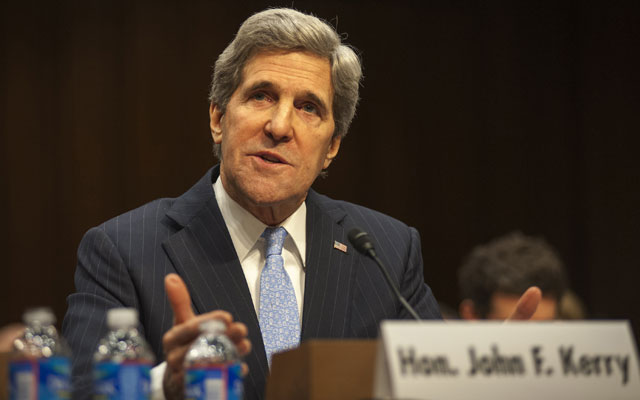The good news for the Obama Administration is that its next Secretary of State, Senator John Kerry (D–MA), had the smoothest of sailing during yesterday’s Senate confirmation hearing.
Indeed, the nominees for Secretary of Defense, Chuck Hagel, and Director of the CIA, John Brennan, should be so lucky. The only tears yesterday were Kerry’s at the recollection of his father’s role as a diplomat. (American diplomats these days are a lachrymose lot indeed.)
The bad news for the United States is that Kerry is President Obama’s ideological twin and can be expected to enthusiastically embrace the Obama doctrine and continue the Administration’s pursuit of arms control, international treaties, and climate-change agreements. This is a classic liberal agenda, which will only lead to a further erosion of American global leadership.
Kerry did pay obligatory lip service to American greatness, of course. “Every day that goes by where America is uncertain in that arena, unwilling to put our best foot forward and win, unwilling to demonstrate our resolve to lead, is a day in which we weaken our nation itself,” Kerry said. Hear, hear.
The problem is that the policies pursued by the Obama Administration have had the exact opposite effect. It is, for instance, all very well to talk about eliminating the threat of Iran’s nuclear weapons, as Senator Kerry did so eloquently, but it also means having the military means to do so as a last resort. Strong American leadership means preserving a superior military, protecting American sovereignty from the encroachment by international treaties and organizations, as well as promoting global economic freedom.
The list of issues presented by Kerry in his opening remarks looked very different, a roll call of transnational problems, which eliminate any consideration of unilateral action or national interest: “Inextricably linked economic, health, environmental and demographic issues, proliferation, poverty, pandemic disease, refugees, conflict ongoing in Afghanistan…and the accelerating pace of technological innovation shifting power from nation-states to individuals.” And of course there is climate change, which according to Kerry is as big a national security issue as any terrorist threat.
On the subject of terrorism and Benghazi, Kerry disappointingly, but predictably, defended outgoing Secretary of State Hillary Clinton’s role in the security failure that cost Ambassador Christopher Stevens and three other brave Americans their lives in Libya on September 11, 2012.
Senator Ron Johnson (R–WI) brought up his flap with Secretary Clinton in Thursday’s hearing, as he attempted to hold her accountable for the misleading narrative of the attack presented to the American people by the Administration. Kerry told Johnson he would not get “any daylight between me and Secretary Clinton.” And when Johnson said that the American people “were misled,” Kerry interrupted him. He even took a shot at Johnson for not attending one of the Administration’s briefings on what happened in Benghazi. This does not bode well for the follow-up to the investigation under Kerry’s leadership at State.
For Obama, the nominations of Kerry, Hagel, and Brennan are comfort food, friendly reassuring caretakers of his agenda. The rest of the country—and the world—may well be in for heartburn.
To learn more about what questions about particular defense issues that Senators need to ask President Obama’s nominees, please see:
Middle East and North Africa Issues
U.S. Policy on Sub-Saharan Africa
U.S. Policy on Arctic Security
